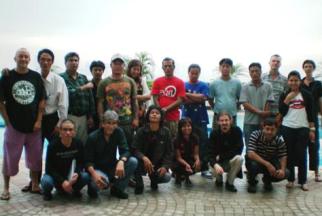In a meeting in Bangkok last weekend, more than two dozen drug users from nine different countries came together to put the finishing touches on the creation of a new drug user advocacy organization, the Asian Network of People who Use Drugs (ANPUD). The Bangkok meeting was the culmination of a two-year process began at a meeting of the International Congress on AIDS in Asia and the Pacific in Colombo, Sri Lanka, in 2007, and resulted in the creation of a constitution and the selection of a steering committee for the new group.

ANPUD currently has more than 150 members and sees its mission to advocate for the rights of drug users and communities before national governments and the international community. There is plenty to do. Asia has the largest number of drug users in the world, but is, for the most part, woefully retrograde on drug policy issues. Not only do drug users face harsh criminal sanctions -- up to and including the death penalty -- but Asian countries have the lowest coverage of harm reduction services in the world. Access to harm reduction programs, such as needle exchanges and opioid maintenance therapy, is extremely limited.
"People who use drugs are stigmatized, criminalized and abused in every country in Asia," said Jimmy Dorabjee, a key figure in the formation of ANPUD. "Our human rights are violated and we have little in the way of health services to stay alive. If governments do not see people who use drugs, hear us and talk to us, they will continue to ignore us."
The Director of the UNAIDS Regional Support Team, Dr. Prasada Rao, spoke of the urgent need to engage with drug user networks and offered his support to ANPUD, saying that "For UNAIDS, HIV prevention among drug users is a key priority at the global level." Rao continued, "I am very pleased today to be here to see ANPUD being shaped into an organization that will play a key role in Asia's HIV response. It is critical that we are able to more effectively involve the voices of Asian people who use drugs in the scaling up of HIV prevention services across Asia."
"When I go back home, I am now responsible for sharing the experiences with the 250 or so drug users who are actively advocating for better services at the national level," said Nepalese drug user and newly elected steering committee member Ekta Thapa Mahat. "It will be a great way for us to work together and help build the capacity of people who use drugs in Asia."
"The results of the meeting exceeded my expectations," said Ele Morrison, program manager for AVIL's Regional Partnership Project. "The participants set ambitious goals for themselves and they have achieved a lot in just two days to set up this new organization. The building blocks for genuine ownership by people who use drugs is definitely there."
While the meetings leading to the formation were organized and managed by drug users, the process received financial support from the World Health Organization, the UNAIDS Regional Task Force, and AIVL.
Comments
takes a lot of courage
I admire these people. If you don't know how harsh it really is, check out www.webehigh.com which profiles practically every country in the world in regards to it's tolerance (or lack of) toward marijuana and its consumers. the harshest countries are all in asia where it's common to report someone to the police for evern talking about smoking marijuana, and in S. Korea where they can pull you aside on the street and randomly drug test you, so even if you're just a tourist who smoked a bowl before you left home, and you test positive for metabolites in your system, you can be convicted of drug possession and sentenced to years in one of their prisons.
Stand Tall
The war has to be exposed for what it really is , and these brave souls are starting to tell all the rest of the world . This is an unbeliveable act of courage on their part. I don't think I could be as brave as they are.
What Costa doesn't say
Liberalization of laws against cannabis in Asia might interfere with the present successful campaign by international tobackgo corporations to increase youth addiction to nicotine now that economic progress has brought about a situation where teenagers in Asia have enough money to buy more $igarettes. Result: global $cigarette death toll reached 5.4 million in 2008 (WHO est.), to 6 mil. by 2010 (Amer. Cancer Society est.).
Add new comment